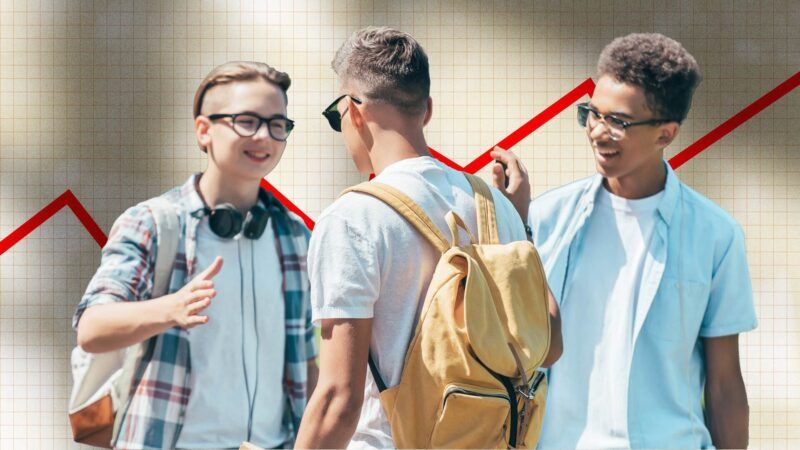No, Most High School Boys Aren't Conservative
A new survey has sparked misplaced panic.

High school boys are now twice as likely to identify as conservative than liberal. Girls, on the other hand, are almost three times as likely to identify as liberal than conservative. This stark gender divide—found in a 2022 University of Michigan survey of high school seniors—has sparked concern from across the political spectrum. A trend of boys becoming more conservative seems to show everything from proof that young men are becoming "fascists" to the likely fall in marriage rates.
But what if the survey doesn't spell quite as much doom as it seems to?
Many commenting on the survey failed to notice that majorities of both genders responded without identifying a partisan political identity. The source of concern is concentrated among the paltry 23 percent of boys who identified as conservative and 30 percent of girls who identified as liberal—leaving just 13 percent of boys identifying as liberal, and 12 percent of girls as conservative. But 64 percent of boys and 58 percent of girls didn't identify as conservative or liberal—instead, they identified as "moderate," "none of the above," or "I don't know."
Yes, more boys than girls identify as conservative—about twice as much, according to the survey—and girls identify as liberal at a rate 17 percentage points higher than their male classmates. But this divide only pertains to a minority of young people.
The survey found that most high school seniors simply don't have a strong partisan political identity—the majority of them were either unsure of their beliefs or their opinions were more complicated than a two-dimensional left-right dichotomy.
However, this hasn't kept some from drawing overwrought conclusions from the data.
"Among liberals, the future is female," wrote psychology professor Jean Twenge of the survey in her book Generations. "And among conservatives, the future is male."
A Fox News article even insisted that "girls trend overwhelmingly liberal," despite only one in three of them identifying as such.
The fervor over the survey's results seems to play into a larger panic around social media's apparently pernicious influence on young people. From the left, too much Joe Rogan and Andrew Tate is pushing boys into a cycle of alt-right radicalization. And right-wing commentators argue that social media is causing girls to become depressed liberals.
But in reality, these surveyed high school seniors don't seem to care all that much about partisan politics, and those that do just happen to have a split along gendered lines. We shouldn't fret over supposedly polarized young people, particularly when they seem to slightly disfavor your political side. And we certainly shouldn't suggest, as many have, that government regulation of social media or online speech would do any good for them.


Show Comments (165)